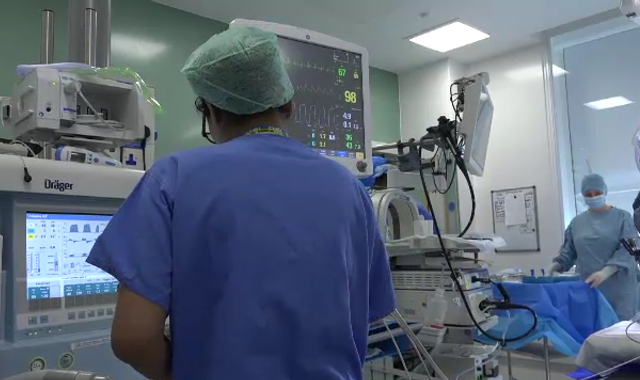This NHS trust got a grip of its waiting list - can others around the country do the same?

Consultant colorectal surgeon Simon Gonsalves is preparing his team for theatre.
One by one they announce their names and role. A pre-surgery report is read out. This gives the team vital information about the patient and the procedure they're about to perform.
First on the list is a 55-year-old, male rectal cancer survivor. He's wheeled in on a gurney and transferred carefully to the operating theatre table, completely unaware as the general anaesthetic holds him in a state of deep stupor.
As he's performing the surgery, Mr Gonsalves explains: "We're at a stage now where we're looking to go on to improve his quality of life by reversing his stoma to try and get him passing stools normally."
The NHS waiting list in England has grown again. Some 7.6 million treatments are waiting to be carried out. And the endoscopy being performed by Mr Gonsalves is exactly the sort of life changing procedure that 6.3 million patients are having to endure lengthy waits for.
Mr Gonsalves tells me: "They're very important to patients, I think that's the most important thing to say. I mean what we're trying to do is to ensure that this gentleman can go on to live a normal life after surviving his rectal cancer treatment."
Diane Craven knows just how important early intervention can be. Her breast cancer was found in June and removed just weeks later.
"I've heard horror stories and listened to other people, but this is my first experience of an operation, so I wasn't really expecting any time limits, but it's just been amazing. It's literally been so quick, I haven't had time to think or worry too much," she said.
Calderdale and Huddersfield NHS Foundation Trust has turned one of the longest waiting lists in the country into one of the shortest. One of the ways it's managed this is by incentivising theatre staff to work at weekends. It is now one of the country's top performing trusts.
The new health secretary, Wes Streeting, will look to replicate the success of this trust across the NHS in England. He will demand greater efficiency from NHS bosses, using capacity in the private sector and greater use of new technology.
But new analysis from health thinktank The Nuffield Trust has set out the scale of the challenge facing the health secretary. It says England has fewer hospital beds, lower numbers of key staff and lower levels of investment in buildings and equipment than many other high-income countries. And this is why the NHS in England is lagging behind comparable health systems on how quickly it is recovering from the pandemic.
The thinktank says for hip and knee replacements, average (median) waiting times in England rose more substantially relative to other countries like Spain and Finland and remained stubbornly high into 2023. England's hip replacement waits are still 50% longer than before the pandemic.
Read more on Sky News:
Triple murder suspect in 'serious condition'
Shining actress Shelley Duvall dies
Fire breaks out in spire of famous French cathedral
Launching an independent investigation into the state of the NHS, Mr Streeting said he wants a "raw and honest" assessment that will deliver "the hard truths".
He has appointed Professor Lord Darzi, a lifelong surgeon and innovator, independent peer and former health minister, to lead the rapid assessment, which will be delivered in September.
Its findings will provide the basis for the government's 10-year plan to radically reform the NHS and build a health service that is fit for the future.
Mr Streeting said: "Anyone who works in or uses the NHS can see it is broken. This government will be honest about the challenges facing the health service, and serious about tackling them. This investigation will uncover hard truths and I've asked for nothing to be held back. I trust Lord Darzi will leave no stone unturned and have told him to speak truth to power."
But much of his ambition relies on an exhausted workforce to step up again. Describing the NHS as "broken" and "wrecked" could further demotivate the same NHS staff that will be needed on board to turn the health service around.
Diane's second and last cancer operation has been carried out. Tests after her first operation found that the disease had spread to her lymph nodes. But from finding a lump on her breast to having two surgeries has taken less than a month.
Mr Streeting has this ambition for all patients. A National Health Service that, when it works properly, is saving and changing lives.

 Yahoo News
Yahoo News 
